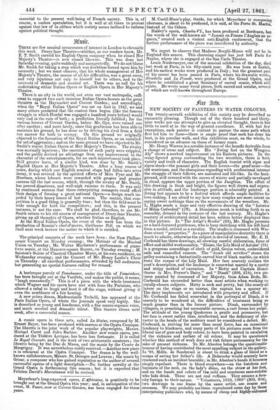Onsir.
Tasso are few musical occurrences of interest in London to chronicle this week. Drury-lane Theatre—whither, as our readers know, Mr. E. T. Smith carried his English Opera company when he closed Her Majesty's Theatre—is now closed likewise. This was done last Saturday evening, quite suddenly and unexpectedly. We do not blame Mr. Smith for taking a step which was doubtless forced upon him by necessity ; but we mast observe, that his whole management of Her Majesty's Theatre, the source of all his difficulties, was a great error, and very injurious not only to himself but to others, and to the interests of dramatic and musical art. There was no call for his undertaking either Italian Opera or English Opera in Her Majesty's Theatre.
There is no city in the world, not even our vast metropolis, suffi- cient to support two such immense Italian Opera-houses as the great theatres in the Haymarket and Covent Garden; and accordingly, when the "Royal Italian Opera" was set on foot in 1847, we and
many others predicted that the contest then be (like the famous straggle in which Handel was engaged a hundred years before) would only end in the ruin of both ; a prediction literally fulfilled; for the various lessees of Covent Garden, before Mr. Gye, were rained one after another; and more lately, since this gentleman has been able to maintain his ground, he has done so by driving his rival from a field too narrow for both to occupy. On this ground we originally objected to the formation of the floyal Italian Opera, as an uncalled- for act of aggression; and on the same ground we have objected to Mr. Smith's repent Italian Opera at Her Majesty's Theatre. The rivalry was mutually injurious ; the operations of each party were crippled, and the public derived no advantage from any improvement in the character of the entertainments, for no such improvement took place. Still greater harm, of a similar kind, was done by Mr. Smith's English Opera at Her Majesty's Theatre. After a long course of years, during which our English musical stage had fallen into utter decay, it was revived by the spirited efforts of Miss Pyne and Mr. Harrison, whose labours were rewarded with greater and greater success till the last season, which, through the rivalry of Mr. Smith, has proved disastrous, and well-nigh ruinous to them. It was only by continued success that these enterprizing managers could effect their design of forming a great national Opera—a design much im- peded by their heavy losses of last season. The maxim, that com- petition is a good thing, is generally true ; but then the field must be wide enough for both the competitors; and this, in the present instance, is not the case. We shall be glad, therefore, to see Mr. Smith return to his old course of management of Drury-lane Theatre, giving up all thoughts of Opera, whether Italian or English. At the Royal Italian Opera, the event of the week has been the production of Rossini's chef-d'oeuvre, Guillaume Tell, on which we shall next week bestow the notice to which it is entitled.






























 Previous page
Previous page